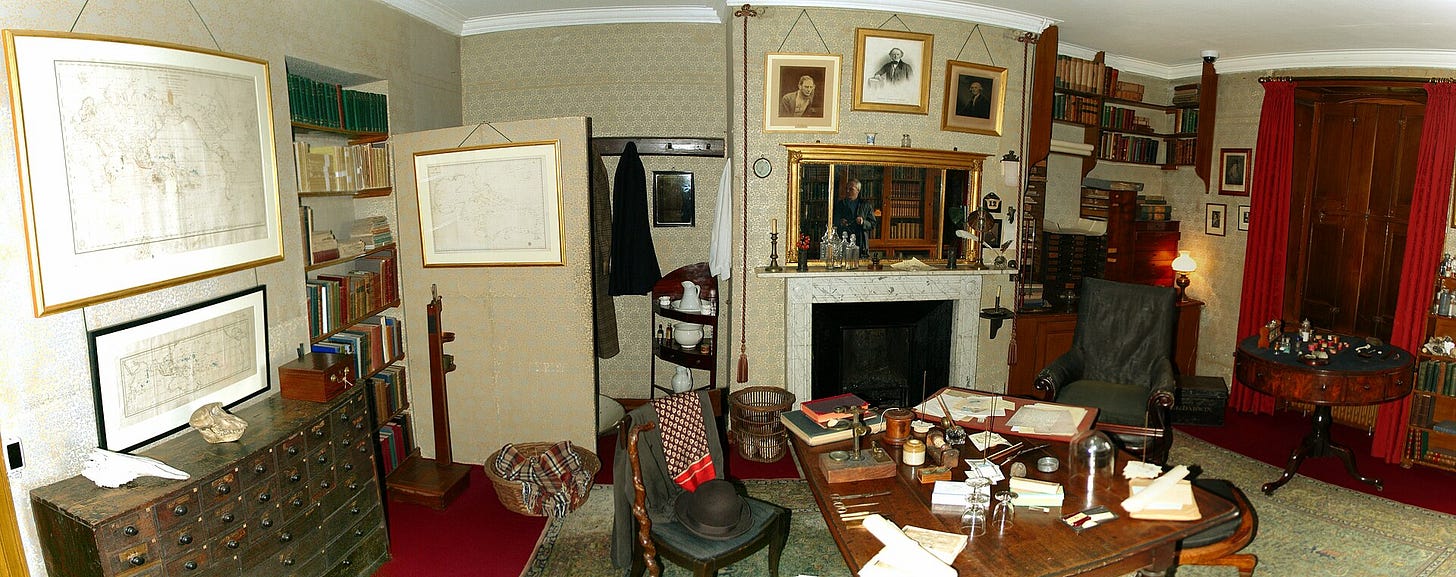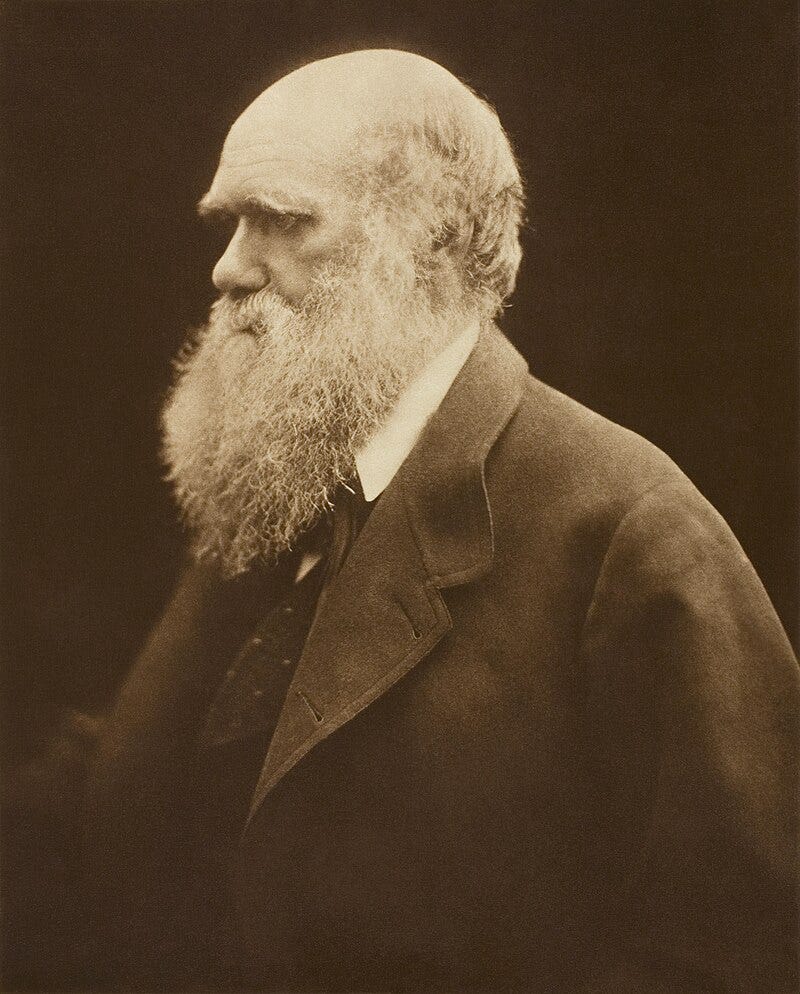Charles Darwin's Impressive Minimalist Routine
Notes on giants - Number 25
Welcome to Mental Garden. The following letter is part of our “Notes on giants“ collection, in which we explore the thoughts of humanity’s greatest minds.
To see the full library, click here.
🏷️ Categories: Time management, Creativity, Happiness, Life lessons.
Charles Darwin, one of the most important scientists of all time.
I’m fascinated by his way of thinking and living. He was a tireless, methodical observer and a lover of nature. His name is associated with great ideas like evolution and natural selection, but behind those words was a very particular man. Recently, I read The Origin of Species and felt the need to know more about him. My curiosity led me to the book Daily Rituals, where his daily routine is described.
It captivated me immediately.
I discovered a person whose lifestyle today would be considered “inefficient” in our productivity-obsessed society — yet it was precisely that slow pace that made him brilliant and memorable. I asked myself: What could I learn from him? What could I apply from his routine to mine in this fast-paced world?
Here’s the answer.
The Importance of Routine
We’ve been sold a romantic lie: the myth of the chaotic genius.
We imagine geniuses as people who work in bursts of inspiration until dawn. Darwin was the opposite. He enjoyed a slow routine, and his workday rarely exceeded five hours. He didn’t need more: he knew that focus mattered more than hours worked. He divided his day into three 90-minute sessions, completely free of distractions. Full attention in short intervals — and nothing else.
And to live this slow, prolific life, he needed a change of scenery…
The Retreat: From London to Down House
In 1842, Darwin moved from London to the countryside — a necessary move.
He only relocated 28 kilometers, but that change transformed his life. Down House became his refuge. There, he designed his routine, his laboratory, and his mental garden. Away from the city’s noise, he found what every creative person needs: silence. A space where ideas could mature without interruption.
That’s where he wrote his theory of species.

He suffered from a chronic illness, and that fragility led him to design his routine carefully.
He couldn’t force himself to work longer hours; he had to work better to continue his biological research. He walked through greenhouses and gardens, observed plants, and took notes. The countryside landscape pleased him far more than London’s. Environment shapes our habits — and our thinking.
Changing your surroundings changes how you think.
It changes what you hear, smell, and see — and therefore, what you think.
Darwin’s Routine
His routine was the definition of balance.
7:00 – Short walk
7:45 – Breakfast alone
8:00–9:30 – First work session
9:30–10:30 – Reading letters with his wife, Emma
10:30–12:00 – Second work session
12:00 – Walk on the “Sandwalk” and visit to the greenhouse
12:45 – Family lunch and reading The Times
15:00 – Rest and reading aloud
16:00 – Another walk
16:30–17:30 – Last work session
18:00 – Rest and reading
19:30 – Tea, backgammon, piano music
22:00 – Sleep
Three work sessions. Three walks. Three breaks.
Darwin understood what we’ve forgotten: virtue lies in balance.
His day alternated between focus and rest. Breaks weren’t wasted time; they were fertile spaces for his mind to recover and enjoy other pleasures of life. Truly productive people are those who can advance by working less.
Now let’s see why this balance was perfect — and worth imitating.
The Science of Walking: Thinking with Your Feet
Darwin walked three times a day.
His favorite path was called the Sandwalk — a gravel trail surrounding a small grove near his home. He would walk in circles, as many times as his energy allowed. To keep count, he placed small stones on the side of the path and kicked one after each lap.
He called it his “thinking walk.”

Modern science proves Darwin right: walking boosts creativity.
When you walk, the images around you move, creating a visual flow that soothes the amygdala — the part of the brain that handles fear and anxiety. That’s why walking clears your mind, lowers stress activity, and sparks creativity.
A study from Stanford University confirmed it: people are 60% more creative while walking and after walking.
Darwin already knew this. If you’re feeling stuck, you need movement.
Rest as a Tool for Thinking
Darwin rested as seriously as he worked.
At three in the afternoon, he would lie on the sofa, smoke a cigar, and enjoy listening to Emma read a novel aloud. Then he’d take a nap. He did this every day — no exceptions. The modern world glorifies overtime; Darwin glorified naps.
It wasn’t laziness — it was how he stayed at 100%.
Great ideas need low-stimulation moments — when you’re walking, showering, or staring out the window. Those intervals of “doing nothing” prepare your mind to think. Modern neuroscientists confirm this. Darwin intuited it. That’s why he never felt guilty for resting — for him, resting well was as important as working well.
To perform like a professional, you must rest like one.
Love, Family, and Play: Darwin’s Other Laboratory
Darwin had ten children and played backgammon with his wife every night.
These leisure moments were crucial. His family kept him grounded, filled him with joy and tenderness, and gave him balance to offset the intensity of his solitary intellectual work. He loved reading letters and novels with Emma, who was also his editor. Family was an essential part of his balance.
Modern research agrees: close relationships — with partners and family — are the strongest predictors of well-being and longevity (Mineo, 2024).
There is no genius without emotional support.
No inspiration without affection.
No life without balance.
The most radical thing Darwin did wasn’t writing The Origin of Species — it was refusing to live in fast-paced London. His routine was an example of extreme focus. He knew that deep thinking requires slowness — and courage.
Courage to leave the big city.
Courage to spend hours in silence.
Courage to focus on one thing.
Among his letters, he once wrote a line that feels provocative today:
“Even my bad health, though it has deprived me of several years of life, has saved me from the distractions of society and amusement.” — Charles Darwin (URL)
He chose moderation. His days weren’t packed with commitments — only consistency.
His slow routine changed his life, and he changed the world.
Want to Learn More? Here Are 3 Related Ideas to Explore:
Why I Chose to Live a Boring Life: Are you living a full life, or just a busy one?
Perfect Days: The film that changed how I see routine, time, and happiness
✍️ Your turn: What kind of balance does your routine have to maintain a fulfilling life?
💭 Quote of the day: “A man who dares to waste one hour of time has not discovered the value of life.” — Charles Darwin, The Voyage: Letter to his sister Susan Elizabeth Darwin.
See you next time — take care! 👋






It only took me three quarters of a century to figure this out. If Darwin saw the intensity at which we live today, he'd absolutely plotz! Totally toxic way of life. Distraction appears to be a goal and perhaps it is. Keep us busy while the shenanigans takes place behind the curtain.
An Excellent Example we should all seek to follow. Thanks~! More walking ahead.